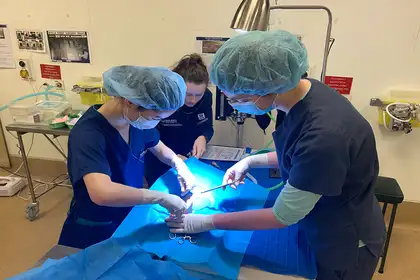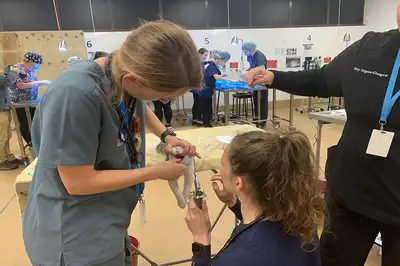
Massey senior veterinary lecturer Carolyn Gates (right) supervises a surgery.
A Massey University programme that provides highly subsidised desexing surgery for cats has reached a milestone: 2000 surgeries.
The programme began in 2017 when senior veterinary lecturer Carolyn Gates set up the desexing clinic after being involved in a similar initiative in the United States. The clinic is a partnership between the Massey University School of Veterinary Science and SPCA Palmerston North.
Desexing surgeries are offered at just $25 for female cats and $15 for males to community service card holders, supergold card holders and Massey students. The surgeries are performed on Saturdays and Sundays.
The clinics are run entirely by veterinarians, nurses, and Massey students who volunteer their time to provide the service to the community. All procedures are performed in clinical training facilities at the Massey University Veterinary Teaching Hospital.

Getting a surgical patient ready to receive a breathing tube.
Lecturer Dr Robert Sawicki says the clinic gives vet students hands-on experience that they would not normally get until later in their degree. “This allows them to volunteer from year one, doing clinical tasks that align with what they are learning in lectures. Students also get the opportunity to help teach their peers under supervision, which helps to reinforce a lot of key concepts,” he says.
For the community, it makes desexing surgery accessible for cats that may not otherwise be taken into a vet.
Dr Sawick’s wife Kathren, who is a fourth-year vet student and co-president of the clinic, says they get people from outside the Manawatū bringing their cats to the clinic, some even all the way from Auckland. “Auckland is probably rarer, but we do get people from Masterton, Whanganui, Dannevirke, Kapiti and Ōtaki bringing their cats in and spending the day out and about in Palmy before picking them up again.”
Mrs Sawicki says the SPCA has noticed a drop in unwanted cat numbers which they believe is related to the work that the clinic does.
More information can be found online here.